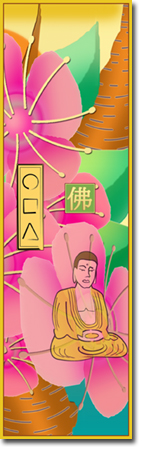On The Way: The Daily Zen Journal
Awakening
Buddha
When I was a young person, at the beginning of my life, I looked at nature and saw that all things are subject to decay and death and thus to sorrow. The thought came to me that I myself was of such a nature. I was the same as all created things. I, too, would be subject to disease, decay, death, and sorrow. But what if I were to search for that which underlies all becoming, for the unsurpassed perfect security which is nirvana, the perfect freedom of the unconditioned state?
So, in the first flush of my independence, I went against my father’s wishes, shaved off my thick black hair, put on a saffron robe, and left my father’s house for a homeless life. I wandered a long time, searching for what is good, searching after an unsurpassed state of peace.
At last, I came to a pleasant forest grove, next to a river of pure water, and sat down beneath a big tree, sure that this was the right place for realization.
All the conditions of the world came into my mind, one after another, and as they came, they were penetrated and put down. In this way, finally, a knowledge and insight arose, and I knew that this was the changeless, the unconditioned. This was freedom.
The reality that came to me is profound and hard to see or understand because it is beyond the sphere of thinking. It is sublime and unequaled, but subtle and only to be found by the dedicated.
Most people fail to see this reality, for they are attached to what they cling to, to pleasures and delights. Since the world is attached to material things, it’s very difficult for people to grasp how everything originates in conditions and causes. It’s a hard job for them to see the meaning of the fact that everything, including ourselves, depends on everything else and has no permanent self-existence.
If I were to try to teach this truth, this reality, nobody would understand me, I thought. My labor and my trouble would be for nothing.
But then it came to me as an insight that I should teach this truth, for it is also happiness. There are people whose sight is only a little clouded, and they are suffering through not hearing the reality. They would become knowers of the truth.
It was in this way I went forth to teach:
For those who are ready, the door
To the deathless state is open.
You that have ears, give up
The conditions that bind you,
And enter in.
Majijhima Nikaya Sutra
All those who clearly understand the fact that enlightenment is everywhere come to the perfect wisdom with a marvelous insight that all objects and structures, just as they are in the present moment, are themselves enlightenment, both the way and the goal, being perfectly transparent to the ineffable. Those who experience the ineffable, known as Suchness, recognize that all structures are radiantly empty of self-existence.
Those who attain perfect wisdom are forever inspired by the conviction that the infinitely varied forms of this world, in all their relativity, far from being a hindrance and a dangerous distraction to the spiritual path, are really a healing medicine. Why?
Because by the very fact that they are interdependent on each other and therefore have no separate self, they express the mystery and the energy of all-embracing love. Not just the illumined wise ones but every single being in the interconnected world is a dweller in the boundless infinity of love.
Prajnaparamita Sutra
Scriptures of the Buddha
Excerpted from The Buddha Speaks edited by Anne Bancroft 2000





Most of us have read the story of the Buddha’s life and awakening, but few of us have read a first-person account like the one above. While it is true that written records follow many years after the spoken word, we forget that in those times, most cultures had a strong oral tradition, which was a very respected way to pass on teachings. We find it almost incomprehensible how much they committed to memory. One can see that in the style of many older sutras, the reliance on repetition and certain phrasing enhances memorization.
The second short piece from the Prajnaparamita Sutra engages us on a very deep level. Just to feel the importance of each sentence is transformative in itself; each line encourages us to slow down and enter the passage. Interconnected and interpenetrating Oneness beyond the sense of separate self…
I climb the road to Cold Mountain,
The road to Cold Mountain that never ends.
The valleys are long and strewn with stones;
The streams broad and banked with thick grass.
Moss is slippery, though no rain has fallen;
Pines sigh, but it isn’t the wind.
Who can break from the snares of the world
And sit with me among the white clouds?
Han-shan
Moving together along the Way,
Elana, Scribe for Daily Zen